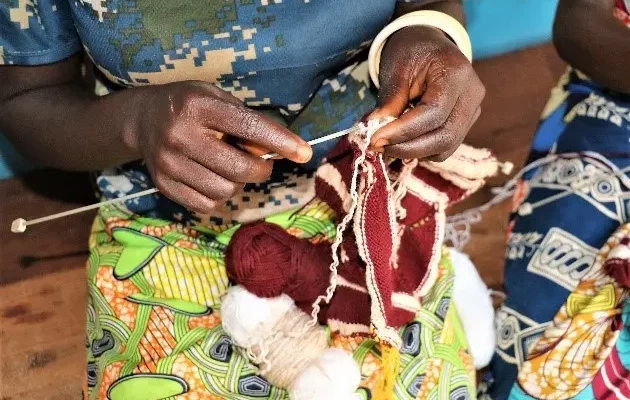Helping survivors recover from gender-based violence
Central African Republic | 2022 | CERF
Bangassou, Central African Republic. Sitting in the courtyard of the Ma mbi si centre, some 20 women and girls sing, draw patterns and knit blankets, tablecloths and clothing.
The group, which includes youth, are all survivors of gender-based violence (GBV). The COOPI NGO provides psychosocial and other support at the centre – whose name means ‘Listen to me’ in the local language.
“One day, about two years ago, armed men came into our village… When we tried to escape into the bush, a man grabbed me by the arm and then assaulted me,” says Laura* ,who is now 18. “For a long time, I hardly slept. Every time I closed my eyes I relived that moment.”
“Here I feel better because psychologists listen to me. And spending time with women who have experienced similar …helps me to move forward. We support each other when morale is low.” Laura says she earns money thanks to the knitting skills she acquired at the centre. “With this income I can buy some food and medications… and save for the next school year.”
Socio-cultural norms that disadvantage women and girls contribute to GBV, which includes physical and psychological violence, rape, early marriage and female genital mutilation. The situation in the Central African Republic is exacerbated by a more than decade-old conflict.
Every hour, almost three people are victims of GBV in the Central African Republic, with more than 17,830 cases recorded in the first 9 months of 2022 – 53 per cent more than the figure for the whole of 2021, according to the GBV Information Management System (GBVIMS).
In June 2022, the Central Emergency Response Fund (CERF) provided funding to the United Nations High Commissioner for Refugees (UNHCR) for the project implemented by COOPI, which operates Ma mbi si centres in Bangassou, Alindao, Zémio and Obo, as well as a free telephone helpline for GBV survivors.
GBV, especially physical attacks and sexual violence, leaves survivors with lasting damage. To help them rebuild their lives, COOPI provides a holistic response that addresses the physical, psychological, legal and economic needs of survivors.
“I will never be the same girl again, but I will face it and move on. I have enrolled in high school and will graduate next year,” Pelvia says.
More information on the CAR Humanitarian Fund.
